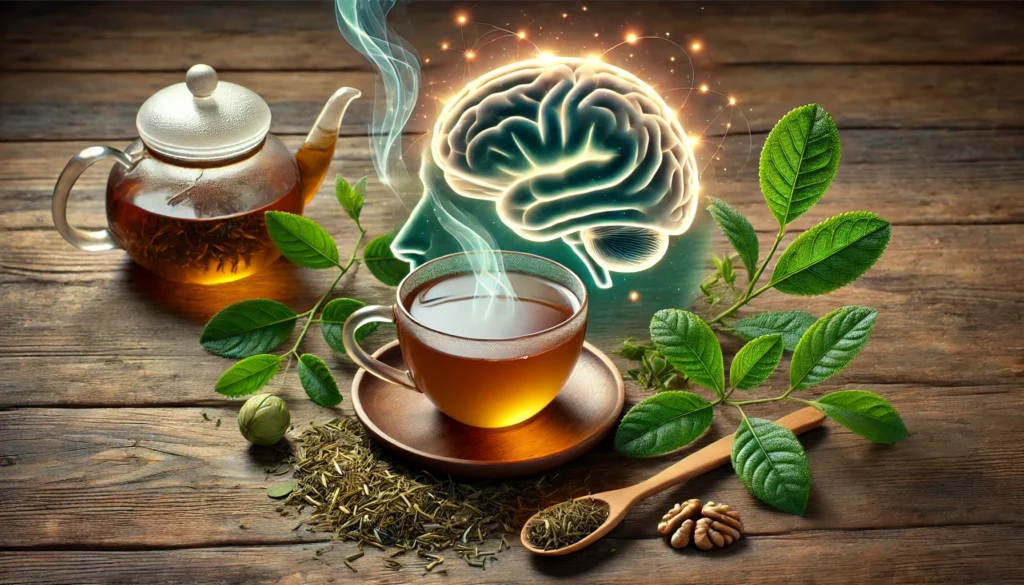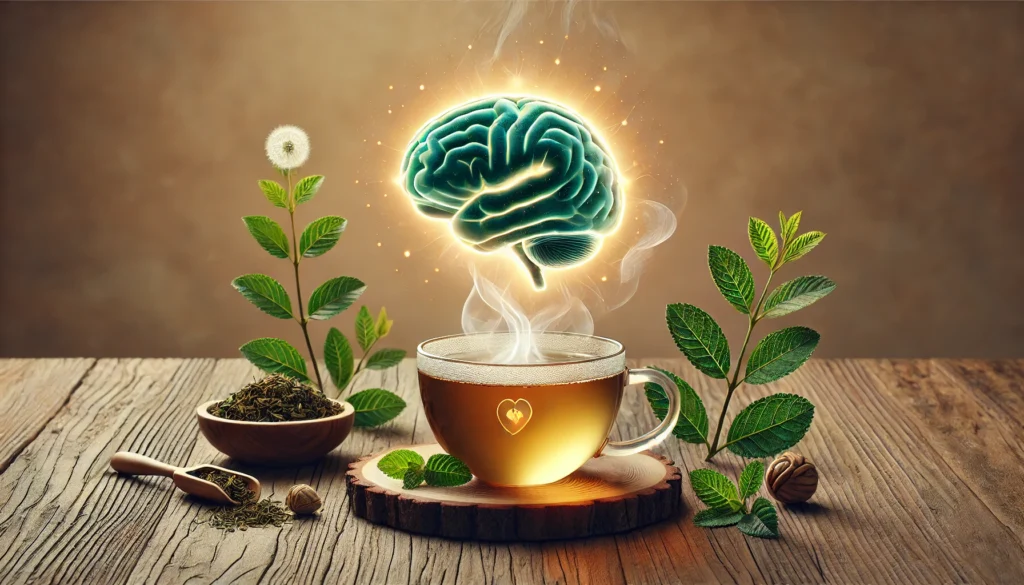Marsh Tea, scientifically known as Ledum palustre, is a plant that grows in the northern regions of the world, including parts of Europe, Asia, and North America. Its history of use in traditional medicine, especially among indigenous cultures, has garnered interest for its potential therapeutic properties. Although Marsh Tea has a rich medicinal history, it has only recently begun to draw attention in the field of nootropics, substances that may enhance cognitive function. This article explores Marsh Tea’s chemistry, physiological mechanisms, nootropic benefits, dosing guidelines, safety considerations, potential interactions, and its use as a supplement for cognitive enhancement.
You May Also Like:
New Jersey Tea: Potential Nootropic Benefits, Dosage, Side Effects, Interactions, and Other Important Information About This Supplement
Sources of Marsh Tea
Marsh Tea is derived from the Ledum palustre plant, which belongs to the Ericaceae family. This plant, also known as wild rosemary, can be found in boggy areas and wetland environments. It thrives in acidic, waterlogged soil and is known for its fragrant leaves and small white or pinkish flowers. The plant has been traditionally used in herbal medicine, primarily for treating respiratory and inflammatory conditions, but its potential as a nootropic supplement is increasingly being explored.
The active compounds in Marsh Tea are primarily concentrated in its leaves, which are harvested for their therapeutic potential. The plant contains a variety of bioactive substances, including essential oils, flavonoids, and alkaloids, which are believed to contribute to its medicinal effects. These compounds are thought to work synergistically to promote overall health, with specific interest in their impact on the brain.

Chemistry of Marsh Tea
Marsh Tea’s medicinal properties are largely attributed to its chemical composition. The primary active ingredients include essential oils such as ledol, palustrol, and myrtenol, which are terpenes known for their anti-inflammatory, antimicrobial, and possibly neuroprotective effects. Additionally, the plant contains flavonoids like quercetin and kaempferol, which are well-known for their antioxidant properties. These compounds may help protect the brain from oxidative stress, which is linked to cognitive decline and neurodegenerative diseases.
Ledol, one of the most prominent compounds in Marsh Tea, has been shown to possess anti-inflammatory and analgesic properties, which could contribute to overall brain health by reducing chronic inflammation. Palustrol, another significant terpene, may have neuroprotective qualities that help prevent neuronal damage, while myrtenol has been studied for its potential calming and stress-reducing effects.
Flavonoids, which are abundant in Marsh Tea, are potent antioxidants that play a crucial role in protecting cells from oxidative damage. Oxidative stress is a significant contributor to cognitive decline, as it damages brain cells and accelerates aging processes. By neutralizing free radicals, flavonoids in Marsh Tea may help preserve cognitive function and promote overall brain health.
Physiological Mechanisms of Marsh Tea in the Body and Brain
Marsh Tea exerts its effects through a combination of its anti-inflammatory, antioxidant, and neuroprotective properties. The plant’s active compounds have been shown to modulate various physiological processes in the brain, potentially improving cognitive performance and mental clarity.
- Anti-inflammatory Effects: Chronic inflammation in the brain, also known as neuroinflammation, has been linked to several cognitive disorders, including Alzheimer’s disease and other forms of dementia. The anti-inflammatory compounds in Marsh Tea, particularly ledol and palustrol, may help reduce neuroinflammation, thereby protecting neurons from damage and supporting cognitive function.
- Antioxidant Effects: The flavonoids found in Marsh Tea, such as quercetin and kaempferol, provide powerful antioxidant protection. These compounds help to neutralize harmful free radicals that can damage brain cells. By reducing oxidative stress, Marsh Tea may play a role in preventing age-related cognitive decline and supporting long-term brain health.
- Neuroprotective Effects: Marsh Tea has been traditionally used to support overall brain health. Some research suggests that the plant may enhance the brain’s ability to cope with stress and oxidative damage, which could make it beneficial in preventing cognitive decline and neurodegenerative diseases.
- Mood Enhancement and Stress Reduction: The essential oils in Marsh Tea, particularly myrtenol, have been linked to calming effects. This can help reduce mental stress and anxiety, which are often associated with impaired cognitive function. By promoting relaxation, Marsh Tea may help improve focus, clarity, and overall cognitive performance.

Nootropic Benefits of Marsh Tea
Marsh Tea’s potential as a nootropic is grounded in its ability to support cognitive function through multiple mechanisms. The active compounds in Marsh Tea may help protect the brain from damage, improve mood, reduce mental fatigue, and enhance focus. Below are some of the primary nootropic benefits:
- Cognitive Protection: Marsh Tea’s antioxidant and anti-inflammatory properties work together to protect the brain from oxidative stress and inflammation, both of which are major contributors to cognitive decline. By preserving brain cells and promoting neurogenesis, Marsh Tea could support long-term cognitive function and mental clarity.
- Improved Focus and Mental Clarity: The calming effects of Marsh Tea, especially through its myrtenol content, may help reduce anxiety and mental fatigue, thereby improving focus and concentration. Mental clarity is often compromised by stress and cognitive overload, but Marsh Tea’s ability to alleviate these factors may enhance productivity and overall cognitive performance.
- Neuroprotection Against Age-Related Decline: As we age, the brain becomes increasingly susceptible to damage from oxidative stress and inflammation. Marsh Tea’s combination of flavonoids and terpenes may protect against these age-related processes, making it a promising candidate for preventing or slowing cognitive decline associated with aging.
- Mood Regulation: Marsh Tea’s calming properties could also play a role in enhancing mood and mental well-being. By reducing anxiety and promoting relaxation, it may help individuals better cope with stress, which can have a positive impact on cognitive performance.

Dosage and Supplementation Guidelines
There is limited research on the optimal dosage of Marsh Tea specifically for cognitive enhancement. However, based on traditional usage and the concentration of active compounds in the leaves, the following general guidelines can be considered:
- General Dosage Recommendations: For general health and cognitive support, a typical dose of Marsh Tea extract ranges from 200 to 500 mg per day. This may vary based on the specific form of the supplement (e.g., powder, capsule, tincture) and the concentration of active ingredients. It is important to start with a lower dose and gradually increase to assess tolerance.
- Caution with High Doses: Due to the potency of certain active compounds like ledol, high doses of Marsh Tea could potentially lead to side effects such as nausea or dizziness. As with any supplement, it is crucial to follow recommended dosage guidelines and consult with a healthcare provider before beginning supplementation.
- Forms of Marsh Tea: Marsh Tea is typically available in various forms, including dried herbs, teas, tinctures, and capsules. The form and concentration of the supplement will influence the appropriate dosage. When choosing a supplement, it is important to look for reputable brands that provide standardized extracts for consistent potency.
Side Effects and Safety
While Marsh Tea is generally considered safe when used appropriately, it can cause side effects, particularly at higher doses or when taken in combination with other substances. Some potential side effects include:
- Digestive Issues: Some individuals may experience mild gastrointestinal disturbances, such as nausea or upset stomach, when using Marsh Tea in high doses. It is advisable to take the supplement with food to minimize these effects.
- Dizziness or Sedation: Due to the calming effects of compounds like myrtenol, excessive use of Marsh Tea may cause dizziness or sedation. Individuals who are sensitive to these effects should exercise caution when using the supplement, particularly when operating machinery or driving.
- Allergic Reactions: Although rare, some individuals may be allergic to Marsh Tea or its components. Symptoms of an allergic reaction could include skin rashes, swelling, or difficulty breathing. If these symptoms occur, supplementation should be discontinued immediately, and a healthcare provider should be consulted.

Interactions with Other Supplements and Medications
Marsh Tea may interact with certain medications or supplements, potentially altering their effects. Some important interactions to be aware of include:
- Sedatives and Anxiety Medications: Because of its calming effects, Marsh Tea may enhance the sedative effects of medications used to treat anxiety, insomnia, or other conditions that cause sedation. Individuals taking such medications should consult with a healthcare provider before adding Marsh Tea to their regimen.
- Blood Pressure Medications: Marsh Tea may have a mild effect on blood pressure, so individuals taking medications for hypertension should monitor their blood pressure closely when using this supplement.
- Anticoagulants: The anti-inflammatory properties of Marsh Tea could interact with blood-thinning medications (e.g., warfarin), potentially increasing the risk of bleeding. Individuals on anticoagulants should exercise caution and consult their healthcare provider before using Marsh Tea.
Risks for Individuals with Certain Health Conditions
- Pregnancy and Breastfeeding: Due to its potential effects on the body’s hormonal balance, pregnant or breastfeeding women should avoid using Marsh Tea unless directed by a healthcare provider.
- Liver or Kidney Conditions: Marsh Tea may exert mild effects on the liver and kidneys due to the processing of its active compounds. Individuals with liver or kidney disease should consult a healthcare provider before using this supplement.
Conclusion: Should You Consider Marsh Tea as a Nootropic?
Marsh Tea, with its unique blend of anti-inflammatory, antioxidant, and neuroprotective compounds, shows promise as a nootropic supplement. Its potential to support cognitive function, protect against oxidative damage, and improve mental clarity makes it an intriguing option for individuals seeking to enhance brain health.
However, due to limited clinical research and varying individual responses, it is important to approach Marsh Tea supplementation with caution. Always consult a healthcare professional before starting any new supplement regimen, particularly if you are pregnant, breastfeeding, or taking medications for other health conditions.

References:
- Rhododendron tomentosum (Ledum palustre). A review of traditional use based on current research. Retrieved from: https://pubmed.ncbi.nlm.nih.gov/23352748/
- Marsh Labrador Tea – Uses, Side Effects, and More. Retrieved from: https://www.webmd.com/vitamins/ai/ingredientmono-114/marsh-labrador-tea
- Oxidative Stress in Alzheimer’s and Parkinson’s Diseases: Insights from the Yeast Saccharomyces cerevisiae. Retrieved from: https://pmc.ncbi.nlm.nih.gov/articles/PMC3371773/
- Unique and interactive effect of anxiety and depressive symptoms on cognitive and brain function in young and older adults. Retrieved from: https://pmc.ncbi.nlm.nih.gov/articles/PMC4222514/
- Oxidative Damage and Cognitive Dysfunction: Antioxidant Treatments to Promote Healthy Brain Aging. Retrieved from: https://pmc.ncbi.nlm.nih.gov/articles/PMC4392815/
Important Note: The information contained in this article is for general informational purposes only, and should not be construed as health or medical advice, nor is it intended to diagnose, prevent, treat, or cure any disease or health condition. Before embarking on any diet, fitness regimen, or program of nutritional supplementation, it is advisable to consult your healthcare professional in order to determine its safety and probable efficacy in terms of your individual state of health.
Regarding Nutritional Supplements Or Other Non-Prescription Health Products: If any nutritional supplements or other non-prescription health products are mentioned in the foregoing article, any claims or statements made about them have not been evaluated by the U.S. Food and Drug Administration, and such nutritional supplements or other health products are not intended to diagnose, treat, cure, or prevent any disease.


